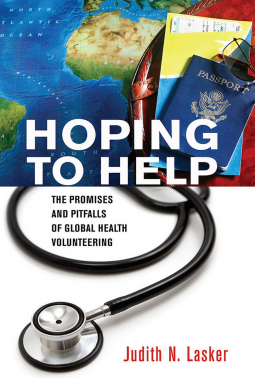
Hoping to Help
The Promises and Pitfalls of Global Health Volunteering
by Judith N. Lasker
This title was previously available on NetGalley and is now archived.
Send NetGalley books directly to your Kindle or Kindle app
1
To read on a Kindle or Kindle app, please add kindle@netgalley.com as an approved email address to receive files in your Amazon account. Click here for step-by-step instructions.
2
Also find your Kindle email address within your Amazon account, and enter it here.
Pub Date Feb 19 2016 | Archive Date Feb 09 2016
Cornell University Press | ILR Press
Description
Overseas volunteering has exploded in numbers and interest in the last couple of decades. Every year, hundreds of thousands of people travel from wealthier to poorer countries to participate in short-term volunteer programs focused on health services. Churches, universities, nonprofit service organizations, profit-making "voluntourism" companies, hospitals, and large corporations all sponsor brief missions. Hoping to Help is the first book to offer a comprehensive assessment of global health volunteering, based on research into how it currently operates, its benefits and drawbacks, and how it might be organized to contribute most effectively. Given the enormous human and economic investment in these activities, it is essential to know more about them and to understand the advantages and disadvantages for host communities.
Most people assume that poor communities benefit from the goodwill and skills of the volunteers. Volunteer trips are widely advertised as a means to "give back" and "make a difference." In contrast, some claim that health volunteering is a new form of colonialism, designed to benefit the volunteers more than the host communities. Others focus on unethical practices and potential harm to the presumed "beneficiaries." Judith N. Lasker evaluates these opposing positions and relies on extensive research—interviews with host country staff members, sponsor organization leaders, and volunteers, a national survey of sponsors, and participant observation—to identify best and worst practices. She adds to the debate a focus on the benefits to the sponsoring organizations, benefits that can contribute to practices that are inconsistent with what host country staff identify as most likely to be useful for them and even with what may enhance the experience for volunteers. Hoping to Help illuminates the activities and goals of sponsoring organizations and compares dominant practices to the preferences of host country staff and to nine principles for most effective volunteer trips.
Advance Praise
“The space where international health volunteering and good intentions collide can get very messy. Hoping to Help cleans up the mess. This book should be required reading for anyone interested in volunteering abroad in any capacity, health service or otherwise.”—Brandon Blache-Cohen, Executive Director, Amizade Global Service-Learning
“Hoping to Help makes a clear and new contribution. The issues Judith N. Lasker examines are increasingly pressing for universities across the United States, as the trend toward internationalization is accompanied by unexpected perverse incentives and adverse impacts such as those Lasker raises. This high-quality book will appeal beyond the global health community to study abroad, service learning, and civic engagement programs, as well as church organizations and civic groups.”—Eric Hartman, Kansas State University
“Hoping to Help has many important implications for potential international volunteers as well as universities, nongovernmental organizations, and religious organizations in particular.”—Benjamin Lough, University of Illinois at Urbana-Champaign
“Hoping to Help is an important read for anyone interested in global health or participating in a global health experience. Judith N. Lasker does an excellent job of framing the issues tied to global volunteering into a larger historical context that adds a deeper understanding as to how we have evolved to the situation we have today. She looks at the issue from many stakeholder perspectives, including, most important, that of the host community.”—Tricia Todd, MPH, University of Minnesota
Available Editions
| EDITION | Other Format |
| ISBN | 9781501700101 |
| PRICE | $19.95 (USD) |
Featured Reviews
 Conrade Y, Reviewer
Conrade Y, Reviewer
One of the growing movements in the helping industry is medical missions. Whether one calls it "voluntourists" or holiday missions, the pattern is familiar. Some group from a rich first world country would organize trips to third-world countries to "contribute" and to do some good for the people there. This is especially so for medical related trips like "medical missions," "health brigades," "flying surgeons," or anything that has medical professionals flown in from the rich to the poor countries. In 2007, researchers have calculated about 1 million Americans have contributed 162 million hours at the cost of $3 billion into third world countries around the world. This figure is just for USA alone. This is not taking into consideration many other private and non-accounted for volunteering by smaller groups. Amid the big impressive figures, there is a growing disquiet among observers looking beyond the nice feeling generated by the huge numbers.
- About 50% of the money spent are airfares.
- How much of these money go directly to the third-world countries?
- Are the third world countries really that poor and dire?
- Are the people there as needy as the Western media paint them to be?
This is not to belittle the contributions made by these "voluntourists." Inspired by the exchanges of Ossob Mohamud (against) and Sam Blackledge (for), author and researcher Judith Lasker conducted two national surveys of trips made six months or less. Focusing on medical care and global health trips, Lasker asks the questions: "What are the benefits and the costs for host communities? How can the benefits be maximized?" This is especially when many of these groups do not have direct contacts on the ground to help them determine the true local needs. At the same time, many groups spend too little time to understand the contexts of where they want to serve. Collaboration is key. Judith Lasker is NEH Distinguished Professor of Sociology and Anthropology at Lehigh University in Bethlehem, Pennsylvania. Her research interests focus on global and women's health.
It is vital to differentiate the words "benefits" and "purposeful trips" from the perspective of the host communities rather than the groups who are volunteering. In other words, anyone seeking to help must understand the true needs of from the hosts' perspectives. Otherwise, such well-intentioned trips may end up making a difference more for those going rather than those receiving. Lasker notes that the lack of a "clear societal model" to such help activities ends up creating more "individualistic approaches" that benefit individuals going rather than the hosts receiving the help. Thanks to the press and the media, the focus of attention also happens to be on the "voluntourists" more than anything else. Politically, governments look good when they are seen giving and donating stuff. The summary of this is captured as:
"Nations pursuing political and security goals, individuals seeking personal advantages, and companies seeking profits also contribute to the growth of this phenomenon."
Some of the critiques include:
Neglecting the true needs of the hosts Providing poor quality work Undercutting locals' employment; (after all, getting something free better than paying a local)
Promotion of dependency Reinforcing the superiority of the volunteer groups over the hosts Cultural colonialism that affect local values and local consumption patterns (like using an advanced electronic device that locals don't have)
Apart from interviewing 119 people, including 55 from host countries in four countries in Asia, Latin America, Caribbean, the author has researched 177 US-based organizations and summarized the findings in this book that contains much data and advice for sponsoring organizations, volunteers, and host communities. Sponsoring organizations include both big corporate names as well as private individuals relying on their personal history and connections with the hosts. The four largest organizations are faith-based, NGOs, educational institutions, and then corporate sponsors. Lasker looks at the history, the origins, the mission, and goals of these organizations in order to understand the rationale for sending these volunteer teams. Faith-based groups are motivated by their love for God, with every major Christian denomination having a mission arm to do just that. While some are unabashedly clear about their identity and evangelism purposes, others are more subdued, choosing to let their actions do the talking. For all the altruism and the generosity, the fears remain that the methods smack of colonial arrogance and cultural show of superiority. NGOs are often not faith-based but are sponsored by rich governments who do not want to give their money to corrupt regimes in the third world. Linda Polman criticizes NGOs for increasing competition rather than cooperation, often complicating the nature of work to be done. Universities are also in the mix, with them requiring medical students to do volunteer hours requirements. Corporate Volunteering makes sponsoring companies look good.
Lasker looks at volunteer groups and looks at the process and result of volunteering. Most groups recruit donors and volunteers located in wealthier countries. They use the Internet. About 60% of the organizations require medical skills training. Cultural adjustments have to be in place for the volunteers when they get to their destinations. Apart from real life eye opening incidents, there is the problem of culture shock and lack of "well-matched experience." Adaptation, fit, and expectations are all factors for both volunteers and hosts. Many individuals come with an attitude of wanting to "give back" something to society, or to find some purpose for their lives. The overriding motivation is self-benefiting. It sure looks good for one's CV, one's career prospects, gaining accreditation, public recognition, and so on. This is confirmed by the feedback from most volunteers who confessed: "I gained more than I gave."
The part on host communities is given a larger coverage than the sponsoring organizations and the volunteers. Rightly so, for without the hosts in the first place, there is no need for any overseas medical missions. This important part focuses on host perspectives of these volunteer programs. They tell of the best experiences like how the locals are impressed with the volunteers' "energy, technical capacities and their eagerness." Good volunteers are those who are open, curious, genuinely interested, humble, respectful, and adaptable. Bad ones are those who are "high maintenance," unwilling to learn, unable to communicate, or have some form of superiority complex. The benefits to host communities include:
- Having extra manpower to help existing needs
- Medicinal supplies and equipment
- Training
- Patient well being
There are other benefits too, like contribution to the local economy, employment of locals, etc. The key maxim for any volunteer is this: "First, do no harm." Then comes the criticisms. Foreign medical missions unfortunately create problems like
- Additional burden on host communities to take care of their visitors
- Untrained and inexperienced volunteers
- Lack of continuity
- Competition between local and foreign medical or dental professionals
...
Fortunately, Part Four of the book gives us some good principles to maximize benefits for the hosts. Principles like fostering mutual understanding with all; maintaining continuity and training of programs; conduct detailed assessment of needs; focus on prevention; build local capacity; and so on. Lasker calls mutuality and continuity as the "two pillars of effective programs." More ought to be done on community focused research and to learn to hone any programming more toward host benefits.
A book like this can seem counter-intuitive to all the good that sponsors and volunteers are doing for the poor, the needy, and the ill-equipped. Yet, it reminds us of the truth that even the best efforts and intentions can create negative images and consequences. For every effort, there will be pluses and minuses. The key is not total abandonment of such volunteer trips, but to learn to be more sensitive, more understanding, and more humble when we go to host countries. We need an other-perspective from the mindset of others. We cannot be fixated on "best practices" and ignore "inspiring practices." We must learn to equip and to train the locals as much as possible. Every short term mission trips must be within the context of a long term continuity. I appreciate Lasker for including the "seven sins of humanitarian medicine."
Sin No. 1: Leaving a mess behind Sin No. 2: Failing to match technology to local needs and abilities Sin No. 3: Failing of NGOs to cooperate and help each other Sin No. 4: Failing to have a follow-up plan Sin No. 5: Allowing politics, training, or other distracting goals to trump service, while representing the mission as “service”
Sin No. 6: Going where we are not wanted or needed and/or being poor guests Sin No. 7: Doing the right thing for the wrong reason
I think this book is a must read for all involved in volunteer medical trips from the top to the bottom. We must bring back into focus that it is not about us, but about them. This means from start to finish, begin with their end and their benefits in mind. Far too often, people start with their own pet ideas of what is needed and how we can help others. The best way is simply to ask with a humble heart before we go. Prepare with willing hearts as we learn the language, the culture, and the contexts of the host communities. Adapt with curiosity and genuine interest as we start our work at the ground level. After that, maintain continuity, communications, and camaraderie, even after the trip is over. See the host communities not as problems to be solved but as people to be loved, to be appreciated, to be served. If there is no long term plan involved, discontinue short term trips.
I recommend this book highly for all volunteers and volunteers to be. This is definitely a must read.
Rating: 5 stars of 5.
conrade This book is provided to me courtesy of ILR Press, an Imprint of Cornell University Press and NetGalley in exchange for an honest review. All opinions offered above are mine unless otherwise stated or implied.


















